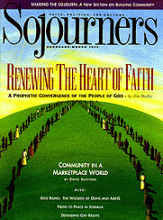We must insist that the Christian message is not simply that God is love; it is that God has revealed his love in Jesus Christ, and Jesus Christ is Jesus Christ horribly crucified--there is no other. That is to say, according to the Christian faith, when God discloses himself as love, he does not in the least lead us away from the terrible things which happen in history. He does not say, "Come away from the horror of things and take a look at the daffodils and crocuses in the springtime; let them speak to you of my goodness." On the contrary he leads us right into the very midst of the horror of things, and meets us there; he speaks to us out of the heart of the darkness.
-Herbert H. Farmer
Extending the Hitler Analogy
LIKENING SADDAM HUSSEIN to Adolf Hitler may have been the single most persuasive argument for going to war against Iraq. Most people agree that Hitler had to be stopped, as indeed he was by the Allies in World War II. Saddam Hussein's treatment of the Kurds inside Iraq was compared to Hitler's treatment of the Jews, and his invasion and annexation of Kuwait to Hitler's occupation of small countries across Europe.
A favorite idea is that Hitler should have been removed from power earlier before he became so strong militarily. Americans and West Europeans were told that in going to war against Saddam Hussein the coalition was seizing the sort of opportunity that had been missed for Hitler. They were not told that the gross national product of Iraq was less than 1 percent of that of the United States and about equal to the economic output of Kentucky.
Read the Full Article

